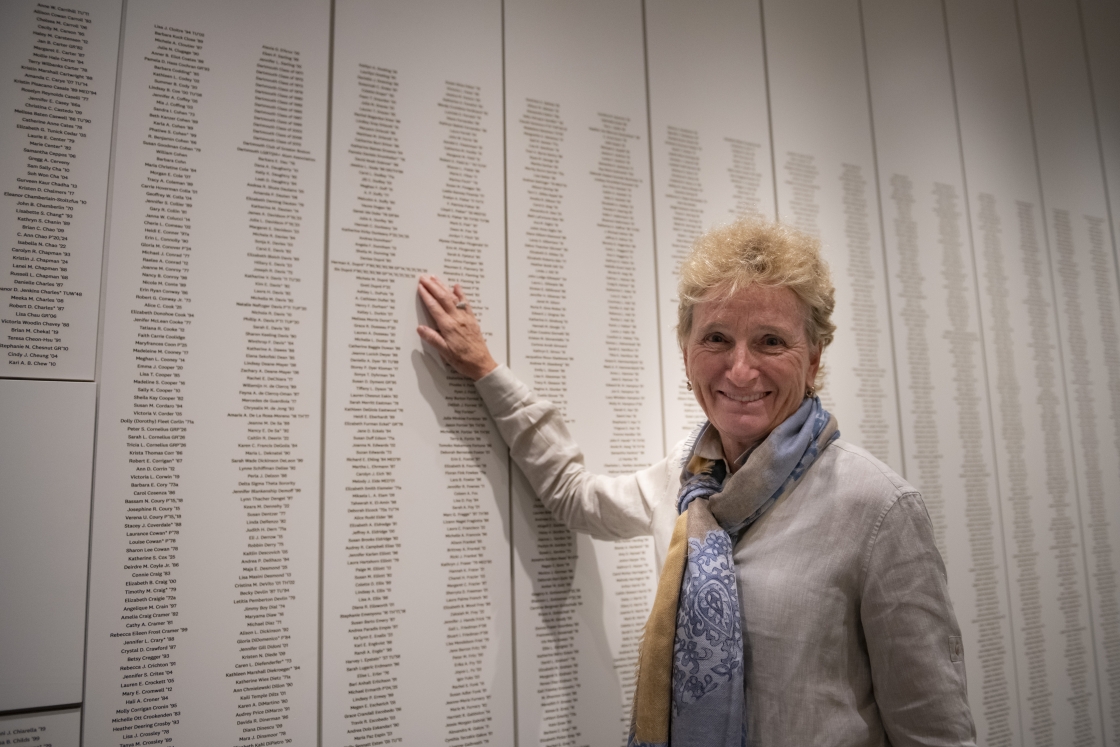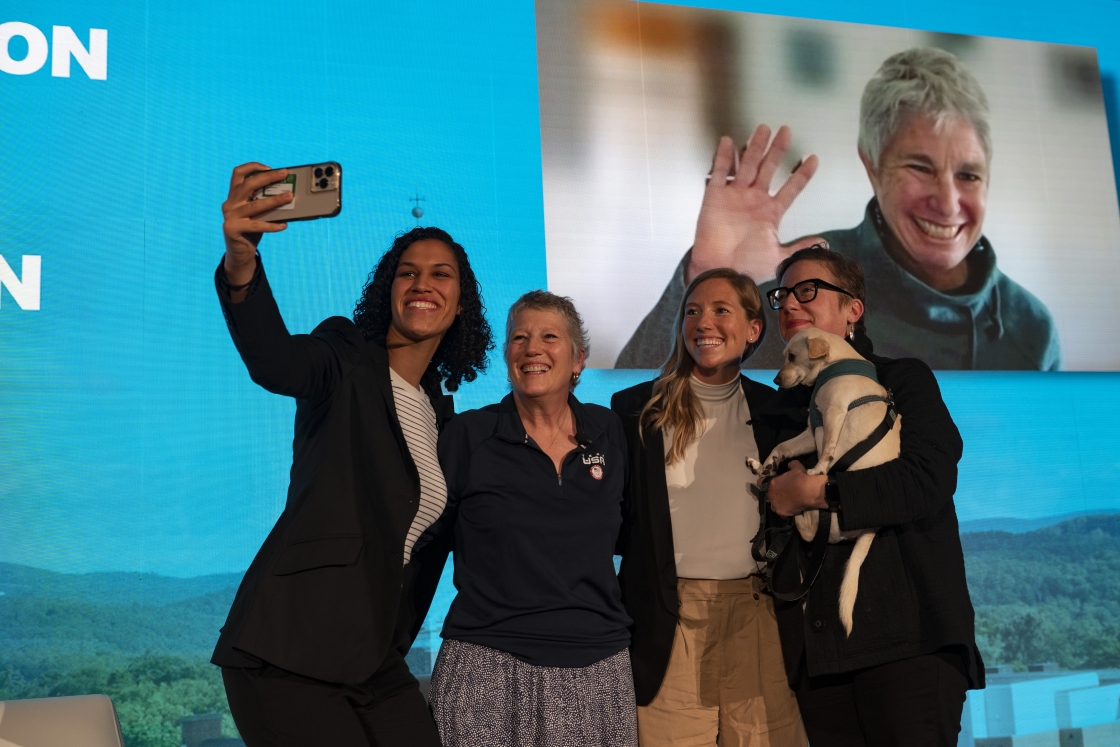More than 500 alumnae from across the country and around the world traveled to Hanover this past weekend to join in the commemoration of 50 years of coeducation at Dartmouth.
“It is such an honor to be here with you to celebrate 50 years of undergraduate coeducation at Dartmouth. The bold decision made by the Board of Trustees back in 1971 was without a doubt the wisest and most consequential board decision in the history of the institution,” said President Philip J. Hanlon ’77, speaking at the Dartmouth Coeducation at 50 keynote panel Saturday morning, attended by hundreds in person and watched by many hundreds more via livestream.
Hanlon held up a copy of the Nov. 22, 1971, issue of the student newspaper, The Dartmouth, emblazoned with the banner headline, “Dartmouth to Admit Women.” The first class of women entered in the fall of 1972.
Women’s leadership was front and center throughout the celebration, which kicked off Friday with the rededication of Dartmouth Hall, where alumnae raised $26 million for the building’s extensive renovation.
Trustee Elizabeth Cogan Fascitelli ’80 formally accepted the building on behalf of the board at the rededication ceremony at the Top of the Hop on Friday evening, moved indoors from the new steps of Dartmouth Hall as the remnants of Tropical Storm Nicole brought rain to Hanover.
“This is a sign of what’s possible, not only for women, but for all of us,” Fascitelli said to a crowd of more than 300 alumnae, trustees past and present, faculty, and others from the highest echelons of business, entertainment, law, tech, the arts, government, and academia, including President-elect Sian Leah Beilock, the president of Barnard College, who will take over in July as Dartmouth’s first female president.
“At the foundation of it all were the friendships I made with fellow Dartmouth women … who would sustain and uplift me until graduation and then in all my life since then,” Fascitelli said.

Elizabeth F. Smith, dean of the Faculty of Arts and Sciences, recognized the remarkable efforts of so many women who made the Dartmouth Hall project a reality, and she applauded that it was achieved to coincide with the celebration of 50 years of coeducation.
“Today we’re really excited to rededicate this newly designed, state-of-the-art building which will champion and serve as the nexus point for the transformative liberal arts education we will offer for generations to come,” Smith said.
Many members of the audience had made their way to the rededication ceremony after touring the renovated and modernized interior of the historic building that Hanlon called the symbolic heart of campus. Over the course of the weekend, almost 300 people toured Dartmouth Hall.
“There is no more iconic building on campus than Dartmouth Hall. It is the first sign of welcome to visitors and prospective students, and one of the most enduring images etched in our memories long after we depart,” Hanlon told the crowd, as the front of building—which will house Dartmouth’s foreign language departments—was lit in green lights, with the words “Thank You” illuminated in five languages.
Earlier in the afternoon as they toured Dartmouth Hall, Donna Halverstadt ’82, Laura Davis ’82, and Barbara Scripps ’80, Kappa Kappa Gamma sorority sisters when they were at Dartmouth, talked about the lifelong bond and connection they had formed. Scripps said the sorority was a good way to connect with other women at a time when men outnumbered women at Dartmouth by 3 to 1. The challenges of being among the first women also opened doors, they said.
“It prepared me for what I encountered at law school and for entering a private law practice. At the time there were very few women in the big firms—the ratio of men to women was even higher than at Dartmouth,” said Scripps. Both Scripps and Davis went on to Harvard Law School and became attorneys. Halverstadt said she had a similar experience as a pioneering woman in Wall Street finance.
Their connection with each other and with Dartmouth has been lifelong, they agreed. “All three of us are on the wall there,” said Halverstadt, pointing to the list in the entranceway naming 2,750 women who contributed to renovate Dartmouth Hall through the Call to Lead capital campaign.
A frequent point of conversation among the women touring Dartmouth Hall on Friday was the board’s decision to name a woman as Dartmouth’s next president. Beilock’s question-and-answer session with Board of Trustees Chair Elizabeth Cahill Lempres ’83, Thayer ’84, on Saturday afternoon at the Hanover Inn ballroom was attended by a huge, enthusiastic crowd.
In the conversation, Beilock extended the idea of the struggle for inclusion of women at Dartmouth to working to welcome people from a broad diversity of backgrounds, viewpoints, and lived experiences. Beilock, a cognitive scientist, said academic excellence requires “different people pushing against each other.”
“I talk a lot about this idea of brave spaces rather than safe spaces. I think oftentimes when you think about a safe space in the classroom it connotes this idea that you shouldn’t feel uncomfortable ever, or push yourself,” Beilock said.
It is OK to make mistakes and it is OK to feel uncomfortable, Beilock said. “The way that we change our views and hone our views is not by talking to people who agree with everything we say. It’s by being challenged and then expressing our thinking.”

The weekend celebration included a wide array of gatherings, panel discussions, presentation, pop-up exhibits, social events, and commemorations.
At the Saturday morning keynote panel, “When Dartmouth Women Lead: Creating Space for New Voices and Perspectives”, former trustee Annette Gordon-Reed ’81, a Pulitzer Prize-winning historian and professor at Harvard, talked about how her Dartmouth experience influenced her life’s path.
“I think being in an environment with so many guys, and in a minority, taught me how to maneuver in that world. I don’t feel out of place with men and the kind of situations that I’ve been in,” Gordon-Reed said. “It created a resilience in me, learning how to maneuver in that environment.”
In addition to Gordon-Reed, the panel of ground-breaking industry leaders and trailblazers that started the day on Saturday included Esi Eggleston Bracey ’91, an executive leading the growth and development of Unilever; Allie Miller ’10, an investor and the youngest woman to build an AI product at IBM; Dartmouth’s Investment Office Chief Executive Officer Alice Ruth ’83; and Laurel Richie ’81, a former trustee chair and the first Black woman to lead a U.S. professional sports league. Moderating the panel was Emily Bakemeier ’82, a former trustee and vice provost for arts and faculty affairs at Yale.
The afternoon session, “Women’s Rights are Human Rights: In the U.S. and Around the World,” featured panelists Tina Dooley-Jones ’82, a retired foreign service member and the Magro Family Distinguished Visitor in International Affairs at Dartmouth’s John Sloan Dickey Center for International Understanding; Becca Heller ’05, executive director and founder of the International Refugee Assistance Project; Tanya Ghani ’03, grants and program manager for the United Nations Trust to End Violence Against Women; and U.S. Sen. Kirsten Gillibrand ’88, D-N.Y., who appeared in a pre-recorded video.
The women discussed their work for women’s rights internationally and at home. Moderating the panel was Eileen Chamberlain Donahoe ’81, a Dartmouth trustee and executive director of the Global Digital Policy Incubator at Stanford.
Dooley-Jones, who spent more than 27 years with USAID, most recently as the first female mission director to USAID/Afghanistan from 2020 until the evacuation of Kabul in 2021, talked about the struggle to help women around the world gain full membership in society.
“My role in USAID, its literally trying to figure out where that entry point is for mindset change, for behavior change, for legislative and regulatory change, and policy change, to effect women’s rights and girls’ rights to be the full participating members of society that they can be,” she said.
The weekend also included opportunities for students to interact with high-profile panelists and other alumnae from a wide range of fields. Saturday Night Live comedian and actress Rachel Dratch ’88 spent time with members of the student improv group, The Dog Day Players. And U.S. Rep. Ann McLane Kuster ’78, D-N.H., and Coeducation Commemoration Chair Jennifer Avellino ’89, a former senior producer for CNN, informally connected with students throughout the weekend.
On Friday, as the Dartmouth Hall rededication ceremony was beginning, Gail Kezer ’82, an attorney and aide to U.S. Sen. Angus King ’66, I-Maine, was talking about the difficulty she had finding her voice as an undergraduate woman at Dartmouth. She said history professor Marysa Navarro, who joined the faculty in 1968, was a tremendous role model who helped her see the significance of being a woman at Dartmouth.
“I always thought I was standing on the shoulders of other women; she helped me understand that there were women standing on my shoulders now,” Kezer said.
At that moment, Barbara Will, the A. and R. Newbury Professor of English and vice provost for academic initiatives and an adviser to the Dartmouth Hall project, took the podium as the celebration began, hailing the pioneering female faculty members of Dartmouth.

“Women like Elizabeth Hapgood, Hannah Croasdale, Marysa Navarro …”
With the mention of Navarro’s name, the room erupted with cheers and applause as Will gestured to the emerita professor at the front of the room.
“Oh, my goodness, she’s here,” Kezer said, joining the ovation.






